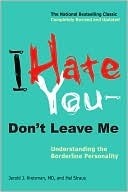More on this book
Community
Kindle Notes & Highlights
Read between
December 15, 2020 - January 3, 2021
The disorder also coexists with, and borders on, other mental illnesses: depression, anxiety, bipolar (manic-depressive) disorder, schizophrenia, somatization disorder (hypochondriasis), dissociative identity disorder (multiple personality), attention deficit/ hyperactivity disorder (ADHD), post-traumatic stress disorder, alcoholism, drug abuse (including nicotine dependence), eating disorders, phobias, obsessive-compulsive disorder, hysteria, sociopathy, and other personality disorders.
If the people in these short profiles seem inconsistent, it should not be surprising—inconsistency is the hallmark of BPD. Unable to tolerate paradox, borderlines are walking paradoxes, human catch-22s.
It’s like, if I hurt myself, the fear and pain will go away.”
the sense of her own identity and the identities of others shift even more dramatically and frequently.
He was able to give her an identity even if the identity involved submissiveness and mistreatment. Yet, for a borderline, relationships often disintegrate quickly. Maintaining closeness with a borderline requires an understanding of the syndrome and a willingness to walk a long, perilous tight-rope. Too much closeness threatens the borderline with suffocation. Keeping one’s distance or leaving a borderline alone—even for brief periods—recalls the sense of abandonment he felt as a child. In either case, the borderline reacts intensely.
He fears abandonment, so he clings; he fears engulfment, so he pushes away. He craves intimacy and is terrified of it at the same time. He winds up repelling those with whom he most wants to connect.
“We are what we pretend to be.” Or, as some phrase it, “Fake it ’til you make it.”
He continues to feel like he is faking it and is terrified that he will, sooner or later, be “found out.” This is particularly true when the borderline achieves some kind of success—it feels misplaced, undeserved.
Though many people get tattoos for decorative reasons, on a societal level the increasing fascination with tattoos and piercings over the past two decades may be less a fashion trend than a reflection of borderline tendencies
he is in constant fear that a trusted person or situation will change into the total opposite—absolute betrayal. A hero becomes a devil;
She is in constant fear that Support could be withdrawn if at any point she displeases. Thus, attempts at reassurance are never-ending and never enough.


